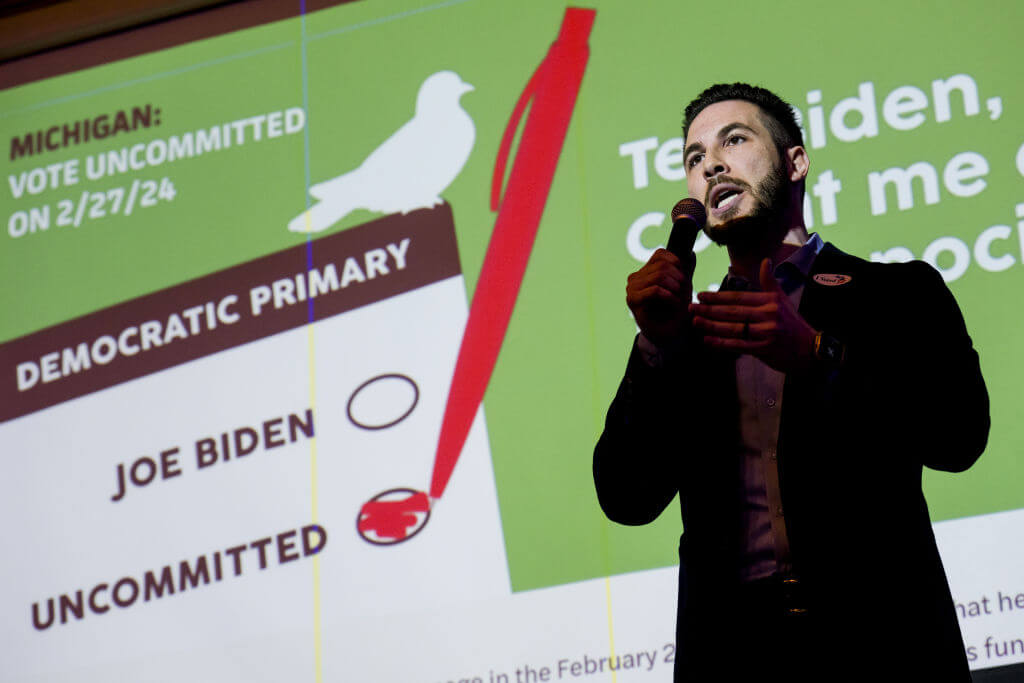Will the ‘uncommitted’ movement against Biden gain momentum on Super Tuesday?
Voters in seven primary states have the option of casting a protest vote against Biden’s Gaza policy

Abdullah Hammoud, mayor of Dearborn, speaks during an election night gathering hosted by Listen to Michigan on Feb. 27. Photo by Nic Antaya/Bloomberg via Getty Images
Activists critical of Biden’s reluctance to support a permanent ceasefire are seeking to leverage their electoral momentum on Super Tuesday, building on a successful campaign in the Michigan presidential primary last week. More than 100,000 Democratic voters marked “uncommitted” on their ballots, to push the administration on the matter.
The results of the presidential primaries and caucuses conducted on Super Tuesday across 15 states are expected to be a key indicator of the protest movement’s strength and impact.
In at least four states — Alabama, Iowa, Minnesota and Tennessee — there is an “uncommitted” option on the ballot. In Colorado voters can choose a “noncommitted delegate” and in North Carolina and Massachusetts there is a “no preference” option.
The biggest push for “uncommitted” is in Massachusetts and Minnesota, targeting younger voters and the Arab American population.
Minnesota, like Michigan, is a crucial battleground in the presidential election. Trump lost the state by 44,000 votes in 2016. Minnesota has 10 electoral votes, compared to Michigan’s 15.
“Uncommitted” has been a ballot option for several election cycles in the states that offer it.
Organizers of the “Listen to Minnesota” campaign said on Monday that they “feel confident” that “uncommitted” votes will be at least double the 2,612 votes cast in the 2020 primary, which was a contest between President Joe Biden and Vermont Sen. Bernie Sanders.
“Democratic voters in Minnesota will ensure Biden knows that his funding of the war in Gaza is costing lives and crucial party support,” said Asma Nizami, the campaign’s spokesperson.
The Democratic Socialists of America, which has 92,000 members nationwide, endorsed the uncommitted campaigns on Sunday. The DSA’s NYC chapter will meet on Wednesday to strategize about New York’s primary in April.
In Massachusetts, an activist organization called “Massachusetts Peace Action” is leading messaging on the “no preference” option.
On Sunday, Vice President Kamala Harris drew praise from the Democratic progressive base by calling for an “immediate” six-week ceasefire in a speech in Selma, Alabama. There were 3,700 “uncommitted” votes in the state’s Democratic primary in 2020. According to an NBC News report, Harris was prepared to take a harsher stance on Israel due to the dire humanitarian situation in Gaza, but was convinced by Biden’s aides to temper her language.
Her office denies that the speech was watered down.
A message from our CEO & publisher Rachel Fishman Feddersen
I hope you appreciated this article. Before you go, I’d like to ask you to please support the Forward’s award-winning, nonprofit journalism during this critical time.
We’ve set a goal to raise $260,000 by December 31. That’s an ambitious goal, but one that will give us the resources we need to invest in the high quality news, opinion, analysis and cultural coverage that isn’t available anywhere else.
If you feel inspired to make an impact, now is the time to give something back. Join us as a member at your most generous level.
— Rachel Fishman Feddersen, Publisher and CEO